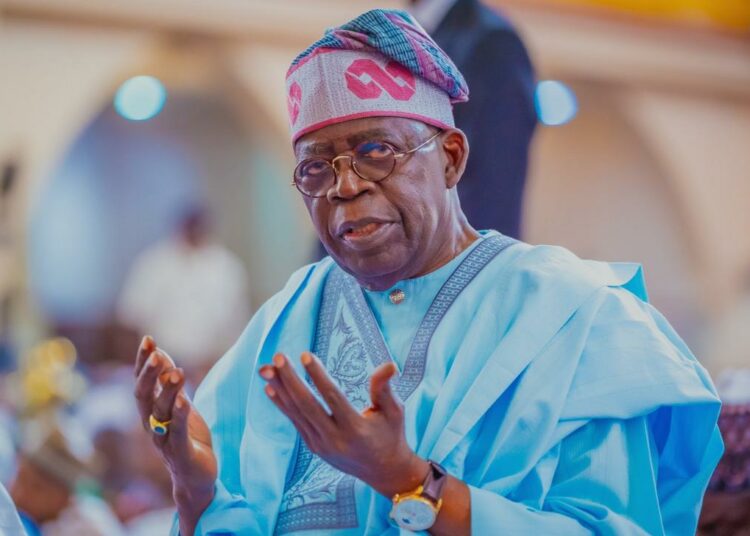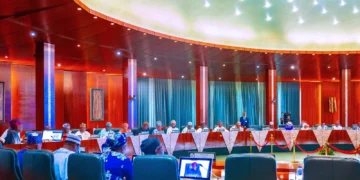As Nigerians celebrated Eid-el-Fitr last Sunday, marking the end of the holy month of Ramadan, President Bola Tinubu’s messages carried more weight than the typical festive greetings we’ve become accustomed to from our leaders.
His first Eid-el-Fitr celebration in Abuja since taking office in 2023 offered a blend of spiritual guidance and practical governance insights that deserve our attention.
Standing at the Abuja National Eid Prayer Ground surrounded by Vice President Kashim Shettima, Speaker Tajudeen Abbas, National Security Adviser (NSA) Nuhu Ribadu, and members of the Federal Executive Council (FEC), the President urged Nigerians to embrace the spirit of the season through greater love and compassion. “We should give thanks to the Almighty Allah,” he said. “We saw the beginning; we started together and ended together in good health and happiness, in prayers for our country and all our people.”
In what seemed like a genuine appeal amid challenging economic times, he asked that we not return to “the old and unacceptable paths” but remain steadfast in practicing the virtues learned during Ramadan, particularly in caring “for the vulnerable, the orphans and the less privileged.”
These sentiments were powerfully echoed by the Chief Imam of the National Mosque, Dr. Abdulkadir Salman Sholagberu, who led the prayers. The Imam’s metaphorical warning against abandoning Ramadan’s teachings was particularly striking: “Your example is like someone who was given paradise, then he got old, became helpless, feeble, weak and turned back against Allah.”
He likened such behaviour to someone who “built for himself a mansion and, unfortunately, by his own hands, pulled it down.”
The Imam’s question resonates deeply in our often-divided nation: “During the fast, we showed love to one another; we cared for people in need, we extended charity, and our country was peaceful. Why should we return to rancour after Ramadan?” Indeed, why should we?
This call for continued harmony and compassion transcends religious boundaries and speaks to our shared humanity.
But it was during the Eid homage at the Presidential Villa where we caught a glimpse of something beyond spiritual guidance – the practical workings of governance decisions and the relationship between the President and the Federal Capital Territory (FCT) Minister Nyesom Wike, which continues to intrigue political observers.
In a moment of refreshing transparency, President Tinubu revealed the considerations behind his approval of the Federal Capital Territory Administration (FCTA’s) exit from the Treasury Single Account (TSA). When Wike approached him with the request to enable more efficient work, Tinubu responded with pragmatic political awareness: “Would that give me any opportunity for my party to win the election in FCT?”
This exchange offers a window into the balancing act of governance – weighing administrative efficiency against political realities. The President, acknowledging the political dynamic between himself and Wike – who comes from the opposition – added another dimension to this calculation: “I know where you are coming from – your own party or my party. If this thing goes too much in your own favour, you will lose your job.”
While some might view this as overtly political, others might appreciate the honesty in acknowledging that governance decisions are rarely made in a political vacuum. This transparency could potentially signal a maturing democracy where the calculations behind policy decisions become more open to public scrutiny.
Beyond political calculations, the President also expressed optimism about the nation’s trajectory, declaring that “hunger is coming down” and “food prices lowering” – assertions that reflect the administration’s perspective on its economic reforms. “We are living in peace, and security is improving. There is satisfaction in our output,” he added, painting a picture of a nation making progress despite challenges.
The President’s commendation of Wike as “a southerner effectively managing affairs in the heart of northern Nigeria” highlights the complex interplay of regional politics while emphasising that “diversity must be used for our prosperity.”
This endorsement of Wike’s performance comes with specific praise for “the revival of abandoned infrastructure, the rehabilitation of health centres and schools, and the modernisation of public services.”
For his part, Minister Wike has been positioning himself as an effective administrator, highlighting achievements like the FCTA’s exit from the TSA, the creation of the FCT Civil Service Commission, new Mandate Secretariats for Women and Youths, and the appointment of permanent secretaries. “None of these significant strides would have been possible without your commitment to the well-being of the FCT and its residents,” Wike told the President.
The minister also tantalising mentioned impactful projects being prepared for commissioning as Tinubu’s second anniversary approaches, noting that the President had personally attended five of the nine projects commissioned during his first anniversary. This suggests a continuing partnership focused on tangible development outcomes.
Perhaps most significantly, Wike emphasised that his delegation represented “the rich diversity of the FCT – spanning religious, political, and traditional leaders, heads of security agencies, civil servants, members of the media, and everyday residents.” His assertion that “despite our different backgrounds, we are united in our unwavering support for your administration” points to efforts at building consensus across Nigeria’s traditional divides.
As we reflect on these Eid celebrations, there’s wisdom in connecting the spiritual messages with governance realities. The exhortation to continue in righteousness even after Ramadan mirrors the need for consistent good governance throughout the year. And just as the Imam warned against building a mansion only to tear it down, our nation must build sustainable systems rather than temporary structures.
The spirit of Eid-el-Fitr calls for compassion, unity, and care for the vulnerable – principles that can guide our governance approach. As the festive meals are consumed and the holiday mood fades, many will be watching to see if these principles translate into tangible improvements in citizens’ lives.
What remains clear is that in both religious observance and governance, consistency matters. The test will be whether the virtues celebrated during religious festivals – and the promising projects highlighted during political events – endure beyond the headlines to create lasting positive change for all Nigerians, regardless of region, religion, or political affiliation.





